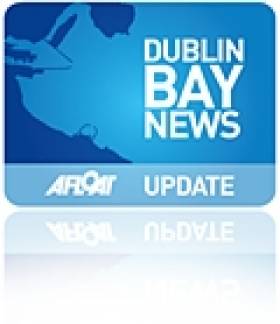Displaying items by tag: Poolbeg Yacht Club Marina
Dublin Bay Oil, Gas, Coal...and Waste-Water!
The work is part of a Dublin City Council project to evaluate an extension at the Ringsend plant where treated water will be released into the bay. The council are conducting detailed feasibility studies which will be examined for an Environmental Impact Assessment.
To date the project has involved two other rigs, the Aran 250 and the larger Excalibur which remains in the bay. The barges will be towed to 20 pre-determined bore-hole locations in the bay where the jack-up rig barges operate 'legs' to sit on the seabed which enables a steady working platform. The rigs are operating on a continuous basis in an area covering most of Dublin Bay and close to the Burford Bank on the eastern fringes.
In addition a buoy will be positioned 300-metres of the barge during drill operations, which is expected to take approximately one week for each drill. For information on the location of the bore-holes, they can viewed from the Dublin Port website by clicking HERE The project is expected to be completed in late Spring.
Several support craft are engaged in the project that recently included the Seabed Worker, a 3,923 gross tonnes Norwegian anchor-handling tug supply vessel (AHTS) the tugs Multratug 7, MTS Valiant and Trojan and the RIB-craft sisters, Brian Boru and James Joyce which are on standby duties. Like the Trojan, the 12-seater RIBS are based at the Poolbeg Yacht Club Marina where in the tourist season the craft provide excursions in Dublin Bay for Sea Safari Tours. In October the project also required the services of the yellow-hulled catamaran, Xplorer to carry out a bathymetric survey of Dublin Bay. The larger tugs and rigs are based opposite in Alexandra Basin / Ocean Pier.
The largest drill-rig working to date on the project, the Excalibur arrived under the tow of the Multratug 7 on a misty morning on Christmas Day. Due to the weather conditions the red-hulled craft slipped quietly into the port. Several days later the imposing looking craft re-emerged with its six-towering jack-up 'sea-legs' that jutted skywards into an otherwise horizontal expanse of Dublin Bay.
The sight of the rig has presented many onlookers to mistakenly believe the drilling was for oil!...Not so but the assumption is not surprising given the reports last year of an oil-field discovery named the Dalkey Island Prospect. The name for the oil-field was referred to Dalkey, as the coastal suburb on the southern shores is the nearest landfall to the exploratory well sites at the Kish Bank Basin.
In fact this kind of exploratory activity was again to confuse residents throughout the bay when the drill-ship, Fugro Synergy was offshore at the Kish Bank between December 2009 and early Spring of 2010. Though on this occasion the search was not for oil but coal!
During this period the 5,200 tonnes vessel equipped with a drill-tower, seemed to be a near permanent feature on the horizon. A series of drill-wells up to 3,500-metres were conducted when the 2009 built ship was contracted to Irish based VP Power Ltd, to determine the commercial viability of extracting coal from the sea for generating electricity. The Underground Coal Gasification (UCG) project is a process where coal is heated in underwater rock reservoirs to extract gas, essentially converting gas-from-coal energy. Otherwise this method is commonly referred to as a 'clean' technology.
In addition to last year's search for deposits of large coal seams under the seabed, there was reports of a significant natural resource in the form of oil!... when several exploratory blocks again in the Kish Bank Basin were surveyed. The company behind this venture, Provident Resources, another Irish based exploration company, conducted initial oil surveys using air-born craft and as such no actual drill-based ships or rigs were used. Though should any oil flow, such an operation would be required.
Incidentally the Excalibur is designed also to perform offshore wind turbine installation work and is equipped with a 250-ton crane to hoist the wind-farm components. The vessel is operated by Fugro Seacore, a subsidiary of the Dutch parent company, Fugro, which also managed the drill-ship Fugro Synergy.






























































